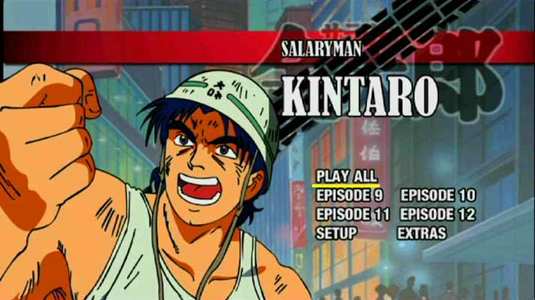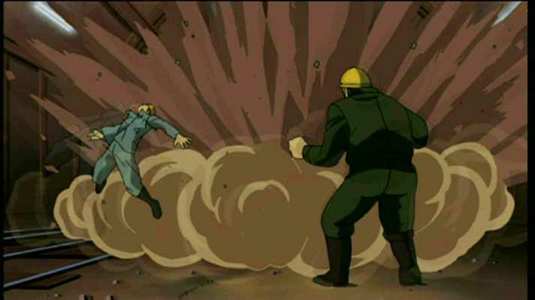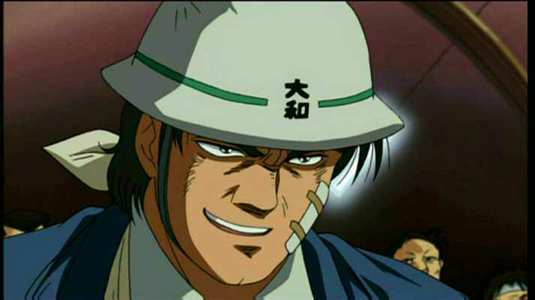Review of Salaryman Kintaro: Part 3
Introduction
Japanese anime is a veritable feast of story ideas, with the fantastic and exotic becoming commonplace in the world of animation. Browse in your local anime emporium and you`ll find sci-fi set in the distant future, stories about cyborgs, spaceships, post apocalyptic Earth. You`ll find madcap comedies where ineffectual nerdish teenage boys can attract legions of sexy females, or you can find intelligent stories that challenge the very perception of reality, as well as historical epics, horror, Westerns, even erotica. In other words, whatever the human mind can envisage can be brought to life in animation form. Salaryman Kintaro is the story of a white-collar worker in a construction company. Anime also apparently handles the mundane.
The white-collar worker drives modern economies, and in Japan more than most. It is a whole subsection of society that serves in offices the nation over. These modern day serfs are expected to swear loyalty to a company in return for a job for life (at least that was the idea before the last recession). The company always comes first, above and beyond lesser matters like personal well-being or family. Twelve-hour days are commonplace, and the work culture extends beyond work hours, as it is expected for work colleagues to socialise when the day is through to build team spirit. The salaryman is the vital grist that the wheels and cogs of Japanese industry grind up and spit out.
Salaryman Kintaro is the reaction to this culture of overwork, first explored in the manga by Hiroshi Motomiya. This anime adaptation follows the career of Yajima Kintaro, who once led a bike gang of 10000 members and had built a reputation as a tough guy. Becoming a father changed all that, and now raising his son alone after the mother died in childbirth, he`s vowed to become respectable. He`s got a job at Yamato Construction, where his straightforward attitude, and tendency to speak with his fists has made him stand out where quiet mundanity is the required attitude. It`s all change at Yamato Construction in this volume, as the previous corrupt president has been ousted, and the Chairman has taken back the reins. As a reward, Kintaro has been promoted out of the `pencil sharpening department` and assigned to sales. He`s climbing the first few rungs up the corporate ladder, but his education is harder than one would expect. Fortunately, his personal life is taking a turn for the better. This disc from Artsmagic contains 4 episodes.
9. Kintaro Falls In Love With Misuzu
Kintaro is now the newest member of the sales department, but he is already making waves. His immediate superior Tanaka is surprised when Kintaro`s name is enough to land a lucrative supermarket contract. The reason why becomes clear when a familiar face appears at the meeting. When they go out to celebrate, Kintaro`s recognised once again, and they are invited to an exclusive club. There, Kintaro makes an immediate impression on hostess Misuzu Suenagu. It`s enough to give Tanaka an attack of the green-eyed monster.
10. Kintaro Takes His Orders From The Company
All new executives are assigned to construction projects to see what life for a girder jockey is like, as compared to a suited salaryman. But the orders for Kintaro come from President Kurokawa himself, and he is assigned to the Mt Kousei tunnel project. This government project is a legacy of the old president, and with multiple companies on site, friction is inevitable. Yamato`s contract is under threat because of this, and it is felt that Kintaro`s unique attitude will succeed where the previous executive tragically failed. But Kintaro walks into a labour dispute that leaves him in over his head.
11. Kintaro Tightens Control Of The Site
President Kurokawa has to personally resolve the construction dispute, but leaves Kintaro in charge of getting the project back on track, and on schedule. Once Kintaro gets out of hospital, he`ll have to rethink his attitude and come up with a new approach to employee relations. Then again, where a punch fails, a kick in the nuts will often succeed.
12. Kintaro Follows Through
The work on the tunnel is progressing well, but disaster suddenly strikes with a landslip. The tunnel starts to collapse, and it`s up to Kintaro to rescue the tunnel workers and if possible save the tunnel.

Video
Artsmagic present Salaryman Kintaro on a two-layer PAL disc. The picture is a 1.78:1 anamorphic transfer, which is a fairly problem free standards conversion from NTSC to PAL. There are no significant artefacts, and the only legacy of the conversion is a slight added softness to the image. There`s also no ghosting or jerky pans, and only an occasional hint of aliasing. The animation itself isn`t up to the standard of most modern anime, and indeed were it not for the anamorphic format, I`d take it for a much older programme. The main character designs are distinctive, but some of the supporting characters seem a little generic. The animation is simple and lacks dynamism. It`s reminiscent of older shows where time would be spent on animation only when the story demands it.
That said, the story isn`t adversely affected by this stylistic choice, and it soon fades from the awareness.

Audio
You get a choice of a DD 5.1 or DD 2.0 Japanese soundtracks, no English dub here I`m afraid. The problem that struck me about the Region 1 disc appears again here. The music and effects on the surround track overwhelm the dialogue, and to a much greater degree than on the earlier volumes. I found it necessary to watch the stereo track instead. Salaryman Kintaro is another anime that has a toe tapping theme tune, although the end theme is a little too Chris De Burgh for my liking. As with all the Artsmagic DVDs that I have encountered, there are two subtitle tracks with the programme, differing only in the size of font. It`s a useful addition that takes into account difficulties of vision and differing screen sizes. The subtitles were legible throughout.

Features
This disc continues the discussions with the Director and Producer of the show. Director Tomoharu Katsumata gets a 6-minute interview where he talks about his favourite projects, and how he got offered Kintaro. Also on this disc is a 4-minute interview with producer Toru Nakano and he talks about working with the director and screenplay writer.

Conclusion
If you`ve been following Salaryman Kintaro, then you will know what to expect from this disc. It`s more of the same really, with everyman Kintaro doing at work what none of us have the guts to. If you ever wanted to tell your supervisor where he could stick his team building exercise, wanted to punch someone when your pension fund evaporates, burst into tears of gratitude when your boss recognises your years of hard service, then this series is for you. It`s basically a soap opera set in the construction industry, albeit in anime form. I look back fondly on shows like Dallas and Dynasty, and this show fills that quotient of Machiavellian machinations, melodrama and mawkishness.
It`s very similar in structure to the average soap, with multi-episode storylines complemented by brief plot diversions. There is also a wealth of character in the show, meaning that we aren`t always focusing on Kintaro. That said, Kintaro is the prime mover for the story, it`s his appearance on the scene that has motivated such change in the company, and his example that inspires those he meets. In this volume, his character grows significantly, as he moves from catalyst to prime mover. While it is luck that lands the contract, when he is assigned to the tunnel project, he actually has to learn to do his job, rather than barrelling his way through swinging his fists. It also becomes clear that the effect he has on people is a little more ambiguous than just inspiring adoration. Let`s face it, if a new recruit lands a lucrative contract that you`ve failed to get, without even knowing how he did it, you`d be a little cheesed off too. We also see that he`s finally getting over the loss of his wife, as he pursues a relationship with Misuzu. Of course he`s managed to capture the heart of the most eligible woman in Tokyo. An interesting little relationship triangle seems imminent with the return of Misuzu`s daughter Mimi, who takes a shine to Kintaro.
I`ve said before that this isn`t an anime that has been gifted with a major budget. The animation is cheap and cheerful, and positively archaic in style. But the main characters are distinctive enough, and the animation does enough in getting the story across. This is well worth a look if you want something different from your anime, and it provides an interesting window into another work culture.
Your Opinions and Comments
Be the first to post a comment!